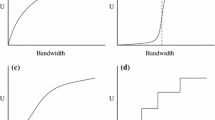Abstract
In this paper we present a framework to mediate the allocation of bandwidth between adaptive and non-adaptive applications. The approach is based on utility function information and provides fair allocation solutions. Novel aggregate utility functions are proposed to allow the solution to scale according to the number of individual flows in the system and to facilitate implementation using common network mechanisms. Numerical results confirm the advantage of using our proposal to avoid the starvation problem whenever adaptive and non-adative flows share network links.
Access this chapter
Tax calculation will be finalised at checkout
Purchases are for personal use only
Preview
Unable to display preview. Download preview PDF.
Similar content being viewed by others
References
Ma, Q., Steenkiste, P.: Supporting Dynamic Inter-Class Resource Sharing: A Multi- Class QoS Routing Algorithm. IEEE INFOCOM 1999 2, 649–660 (1999)
Chen, S., Nahrstedt, K.: An Overview of Quality of Service routing for the Next Generation High-Speed Networks: Problems and Solutions. IEEE Net. Mag. 12, 64–79 (1998)
Floyd, S., Fall, K.: Promoting the Use of End-to-End Congestion Control in the Internet. IEEE/ACM Trans. on Net. 7, 458–472 (1999)
Shenker, S.: Fundamental Design Issues for the Future Internet. IEEE JSAC 13, 1176–1188 (1995)
Sen, A.K.: Collective Choice and Social Welfare. North-Holland Publishing, Amsterdam (1995)
Kelly, F.P., et al.: Rate Control for Communication Networks: Shadow Prices, Proportional Fairness and Stability. Journal of the Oper. Res. Soc. 49, 237–252 (1998)
Sen, A.: The Possibility of Social Choice. The American Econ. Rev. 89, 349–378 (1999)
Rawls, J.: A Theory of Justice. Oxford University Press, Oxford (1999)
Bianchi, G., Campbell, A.T.: A Programmable MAC Framework for Utility-Based Adaptive Quality of Service Support. IEEE JSAC 18, 244–255 (2000)
Mathis, M., et al.: The Macroscopic Behavior of the TCP Congestion Avoidance Algorithm. ACM Comp. Comm. Rev. 27, 1–15 (1997)
Liao, R., Campbell, A.T.: A Utility-Based Approach for Quantitative Adaptation in Wireless Packet Networks. Wireless Networks 7, 541–557 (2001)
Lagoa, C., Che, H.: Decentralized Optimal Traffic Engineering in the Internet. ACM Comp. Comm. Rev. 30, 39–47 (2000)
Ross, K.W.: Multiservice Loss Models for Broadband Telecommunication Networks. Springer-Verlag, Heidelberg (1995)
Kelly, F.P.: Blocking Probabilities in Large Circuit-Switched Networks. Advances in Appl. Prob. 16, 473–505 (1986)
Fletcher, R.: Practical Methods of Optimization. Wiley, Chichester (2000)
Ott, T.J., et al.: SRED: Stabilized RED. IEEE INFOCOM 1999, pp. 1346–1355 (1999)
Salles, R.M., Barria, J.A.: The Proportional Differentiated Admission Control. IEEE Communications Letters 8 (2004)
Jagerman, D.L.: Some Properties of the Erlang Loss Function. The Bell Sys. Tech. J. 53, 525–550 (1974)
Nahrstedt, K., Chen, S.: Coexistence of QoS and Best-Effort Flows: Routing and Scheduling. 10th Inter. Work. Dig. Comm. (1998)
Author information
Authors and Affiliations
Editor information
Editors and Affiliations
Rights and permissions
Copyright information
© 2004 Springer-Verlag Berlin Heidelberg
About this paper
Cite this paper
Salles, R.M., Barria, J.A. (2004). Fair Bandwidth Allocation for the Integration of Adaptive and Non-adaptive Applications. In: Dini, P., Lorenz, P., de Souza, J.N. (eds) Service Assurance with Partial and Intermittent Resources. SAPIR 2004. Lecture Notes in Computer Science, vol 3126. Springer, Berlin, Heidelberg. https://doi.org/10.1007/978-3-540-27767-5_1
Download citation
DOI: https://doi.org/10.1007/978-3-540-27767-5_1
Publisher Name: Springer, Berlin, Heidelberg
Print ISBN: 978-3-540-22567-6
Online ISBN: 978-3-540-27767-5
eBook Packages: Springer Book Archive




